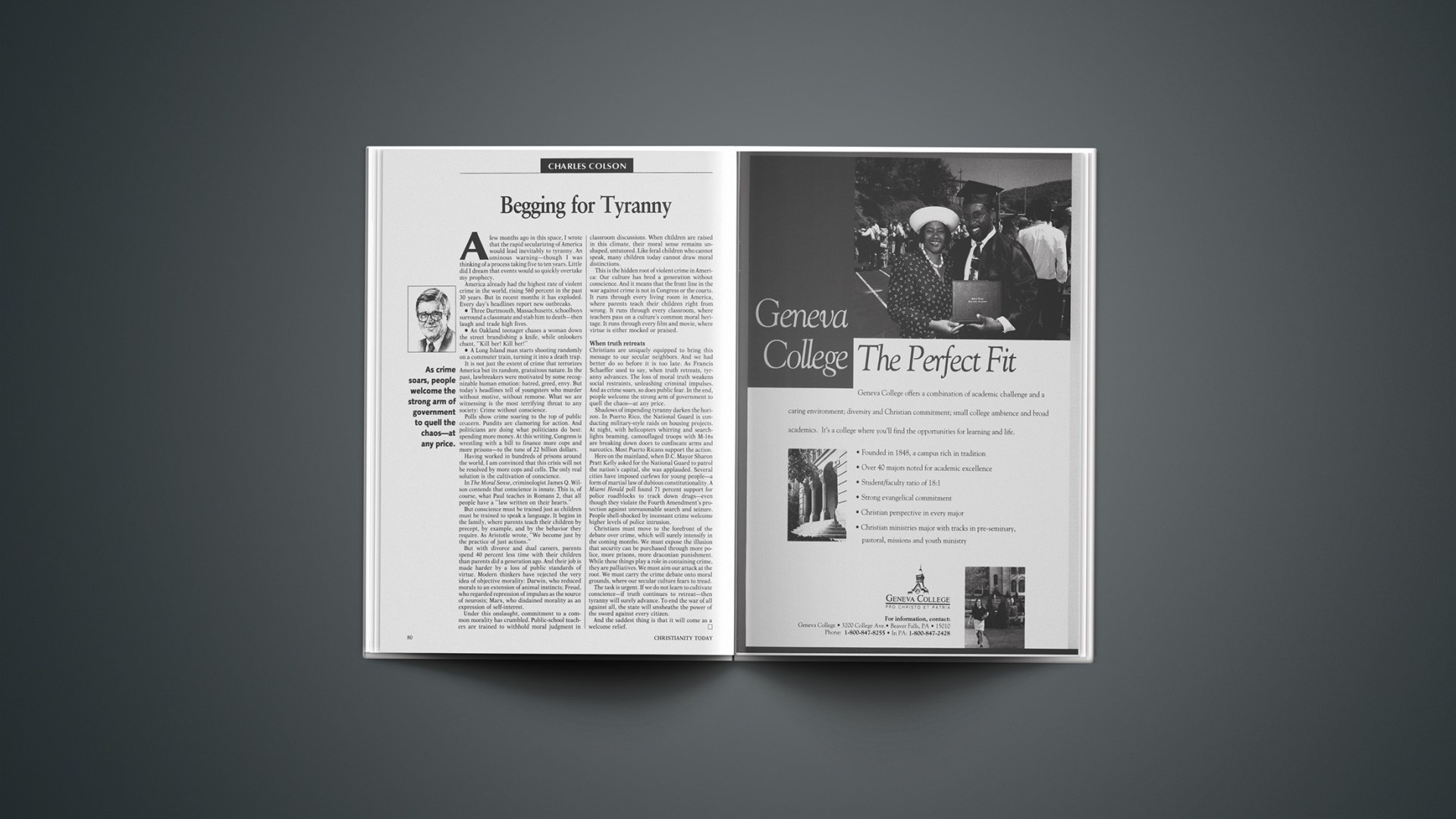A few months ago in this space, I wrote that the rapid secularizing of America would lead inevitably to tyranny. An ominous warning—though I was thinking of a process taking five to ten years. Little did I dream that events would so quickly overtake my prophecy.
America already had the highest rate of violent crime in the world, rising 560 percent in the past 30 years. But in recent months it has exploded. Every day’s headlines report new outbreaks.
• Three Dartmouth, Massachusetts, schoolboys surround a classmate and stab him to death—then laugh and trade high fives.
• An Oakland teenager chases a woman down the street brandishing a knife, while onlookers chant, “Kill her! Kill her!”
• A Long Island man starts shooting randomly on a commuter train, turning it into a death trap.
It is not just the extent of crime that terrorizes America but its random, gratuitous nature. In the past, lawbreakers were motivated by some recognizable human emotion: hatred, greed, envy. But today’s headlines tell of youngsters who murder without motive, without remorse. What we are witnessing is the most terrifying threat to any society: Crime without conscience.
Polls show crime soaring to the top of public concern. Pundits are clamoring for action. And politicians are doing what politicians do best: spending more money. At this writing, Congress is wrestling with a bill to finance more cops and more prisons—to the tune of 22 billion dollars.
Having worked in hundreds of prisons around the world, I am convinced that this crisis will not be resolved by more cops and cells. The only real solution is the cultivation of conscience.
In The Moral Sense, criminologist James Q. Wilson contends that conscience is innate. This is, of course, what Paul teaches in Romans 2, that all people have a “law written on their hearts.”
But conscience must be trained just as children must be trained to speak a language. It begins in the family, where parents teach their children by precept, by example, and by the behavior they require. As Aristotle wrote, “We become just by the practice of just actions.”
But with divorce and dual careers, parents spend 40 percent less time with their children than parents did a generation ago. And their job is made harder by a loss of public standards of virtue. Modern thinkers have rejected the very idea of objective morality: Darwin, who reduced morals to an extension of animal instincts; Freud, who regarded repression of impulses as the source of neurosis; Marx, who disdained morality as an expression of self-interest.
Under this onslaught, commitment to a common morality has crumbled. Public-school teachers are trained to withhold moral judgment in classroom discussions. When children are raised in this climate, their moral sense remains unshaped, untutored. Like feral children who cannot speak, many children today cannot draw moral distinctions.
This is the hidden root of violent crime in America: Our culture has bred a generation without conscience. And it means that the front line in the war against crime is not in Congress or the courts. It runs through every living room in America, where parents teach their children right from wrong. It runs through every classroom, where teachers pass on a culture’s common moral heritage. It runs through every film and movie, where virtue is either mocked or praised.
When truth retreats
Christians are uniquely equipped to bring this message to our secular neighbors. And we had better do so before it is too late. As Francis Schaeffer used to say, when truth retreats, tyranny advances. The loss of moral truth weakens social restraints, unleashing criminal impulses. And as crime soars, so does public fear. In the end, people welcome the strong arm of government to quell the chaos—at any price.
Shadows of impending tyranny darken the horizon. In Puerto Rico, the National Guard is conducting military-style raids on housing projects. At night, with helicopters whirring and searchlights beaming, camouflaged troops with M-16s are breaking down doors to confiscate arms and narcotics. Most Puerto Ricans support the action.
Here on the mainland, when D.C. Mayor Sharon Pratt Kelly asked for the National Guard to patrol the nation’s capital, she was applauded. Several cities have imposed curfews for young people—a form of martial law of dubious constitutionality. A Miami Herald poll found 71 percent support for police roadblocks to track down drugs—even though they violate the Fourth Amendment’s protection against unreasonable search and seizure. People shell-shocked by incessant crime welcome higher levels of police intrusion.
Christians must move to the forefront of the debate over crime, which will surely intensify in the coming months. We must expose the illusion that security can be purchased through more police, more prisons, more draconian punishment. While these things play a role in containing crime, they are palliatives. We must aim our attack at the root. We must carry the crime debate onto moral grounds, where our secular culture fears to tread.
The task is urgent. If we do not learn to cultivate conscience—if truth continues to retreat—then tyranny will surely advance. To end the war of all against all, the state will unsheathe the power of the sword against every citizen.
And the saddest thing is that it will come as a welcome relief.










